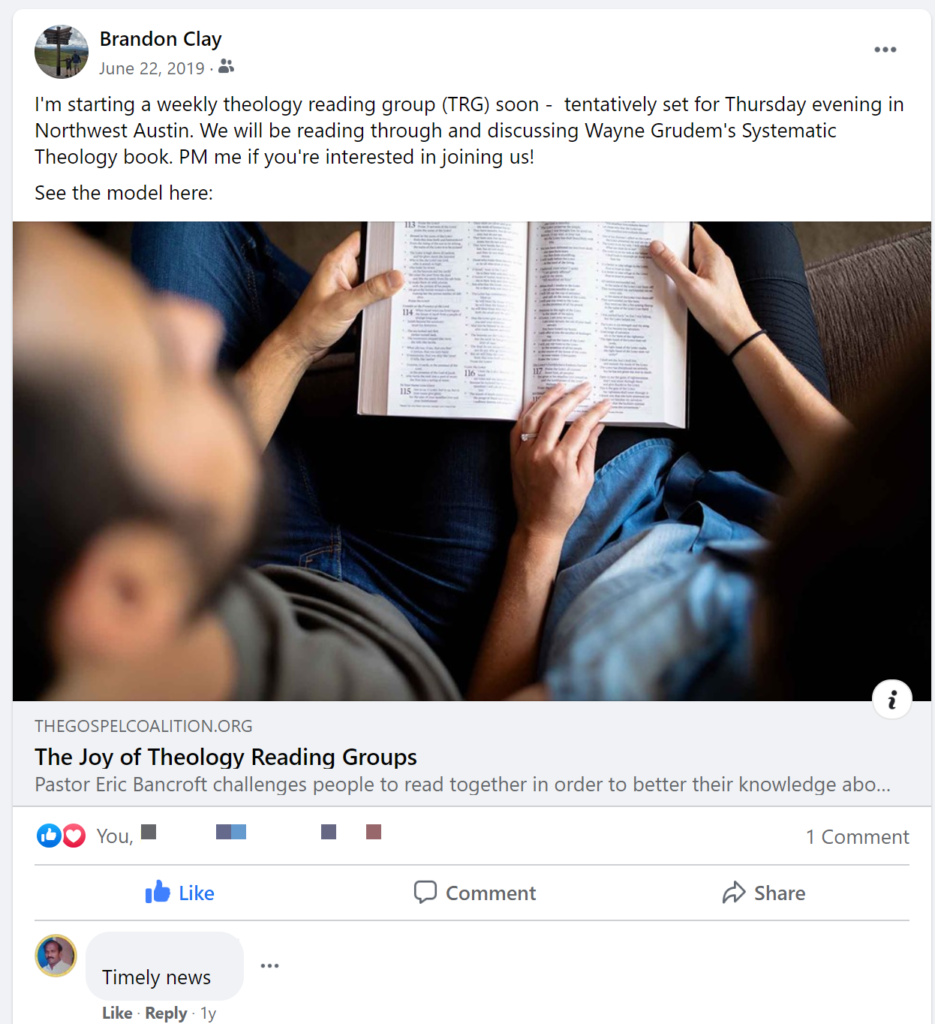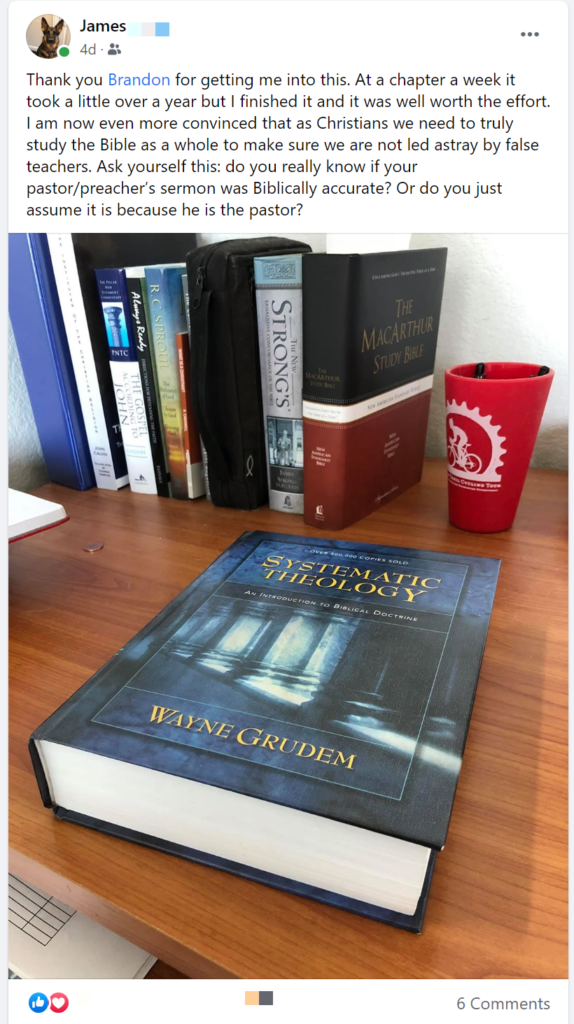Three lessons learned from three guys after completing a theology reading group with Wayne Grudem’s Systematic Theology in 13 months.
On June 22, 2019, I sent out a Facebook post advertising a new “Theology Reading Group.” Not many details, just an overview post with a link to a Gospel Coalition post describing Theology Reading Groups. Since I was teaching an Adult Bible Fellowship (Sunday School) at the time, I asked the guys in my class if they wanted to attend. I also reached out to a few more people outside of class. Not much advertising, but it was enough.

For the initial informational meeting, we had 8 people show up including me. Not bad. By the end of the 13 months, only 3 people remained who showed up every week (minus holidays). So there was quite a drop-off in attendance by the end. I should also mention, the 2019 COVID pandemic hit in the last several months of our theology reading group and I also relocated half-way across the country. We finished the group completely online. But the guys who stuck with it until the end deserve some extra credit.
Personally, the whole reading group took an investment in time. I reread the book we studied: Wayne Grudem’s Systematic Theology: An Introduction to Biblical Doctrine. I also listened to all of Dr. Grudem’s lectures on Systematic theology at Scottsdale Bible Church. Finally, I blogged through the book so it helped me to solidify these lessons for future teaching. There’s nothing like writing out your thoughts as a way to learn.
So I thought it would be helpful to anyone considering starting a Theology Reading Group. Whether you start it in your church, community, or especially now online – here are three takeaways from the remaining participants from our humble group.
Takeaway #1: Good Theology Protects You From Bad Theology
One guy who reached out to me after my initial Facebook post was James. I’ve known James since we worked together at a tech company twenty years ago. He came to Christ later in life and I’ve enjoyed getting to know him more in the last year.
Recently, James posted on Facebook about his experience with our theology reading group – below. To him, getting more biblical context around a Bible teacher is key. After all, we will never know what an error looks like if we’re not familiar with the truth. To James, that’s reason enough to study theology. He wrote:
“Thank you Brandon for getting me into this. At a chapter a week it took a little over a year but I finished it and it was well worth the effort. I am now even more convinced that as Christians we need to truly study the Bible as a whole to make sure we are not led astray by false teachers. Ask yourself this: do you really know if your pastor/preacher’s sermon was Biblically accurate? Or do you just assume it is because he is the pastor?”

And thank you, James for working through everything for 13 months!
Takeaway #2: Don’t Get Intimidated
The second takeaway from the group was from a younger member. Prior to joining, Jacob was an acquaintance I had met at a small business meetup. Here’s Jacob’s take on not getting intimidated interacting with a 1,200+ page theology textbook:
“I’d been looking for a “deeper” Bible study for a while. When I was invited to this Theology Reading Group, I knew it could be a good opportunity to learn more about God. I wasn’t even sure what the words “theology” or “doctrine” meant at the time.
Studying theology with these guys has greatly deepened my understanding of God. But it also shows how much I don’t know. Our thirteen months together was so profoundly impactful on my soul.
The week before our final chapter reading, my new church asked if I’d be interested in starting a “deeper” Bible study group for the young adults. I’m excited for that opportunity, and more in the future.
Every Christian needs basic understandings of core doctrine, now more than ever. If you’ve never been a part of a small group, I know it can seem intimidating. I’ve felt that. But you have to go find one and sit in. Walking with God is a verb; it’s an action. So let’s be proactive.”
Well said, Jacob!
Takeaway #3: Something New Every Time in Theology
The final takeaway from our theology reading group comes from your humble blog post author. We covered material I had already studied in seminary. This was not new material in some ways. But in other ways, it was brand new. Every time I delve into the Bible’s teaching, I can get something new. King David spoke of the treasure and sweetness in God’s word.
“More to be desired are they than gold, even much fine gold;
sweeter also than honey and drippings of the honeycomb.
Moreover, by them is your servant warned,
in keeping them there is great reward.” (Psalm 19:10-11)
Systematic theology is a collection of all the Bible says about certain subjects. In this way, something similar to the Psalm can be said about good theology: a good, biblical theology is more desirable than gold, sweeter than honey, it warns, and obedience to it leads to reward – because it is grounded in God’s word, the Bible.
Application: Start a Theology Reading Group
A theology reading group can be overwhelming at first, but it is so rewarding. I learned so much more about God and have a stronger sense of “getting” theology after my 13-month journey. And as you read from the other comments, the other guys were blessed as well. So what are you waiting for?
Perhaps you should start a theology reading group. It can be in person, like ours started off, or it can be completely online. Whatever may work for you, collect a group of people interested in learning more about the Bible and dive in. Feel free to copy my original announcement text I used in my Facebook post, send it out to your connections, and see what happens. It may be that the Lord will bless you with both some good friendships and a deeper understanding of him through his word. And you will be forever changed through the experience.
Resources
- Wayne Grudem: Book: Systematic Theology: An Introduction to Biblical Doctrine
- Wayne Grudem: 119 Lectures on Systematic Theology at Scottsdale Bible Church
- Brandon Clay: Systematic Theology Study Guide
Photo by Cassidy Rowell on Unsplash.








